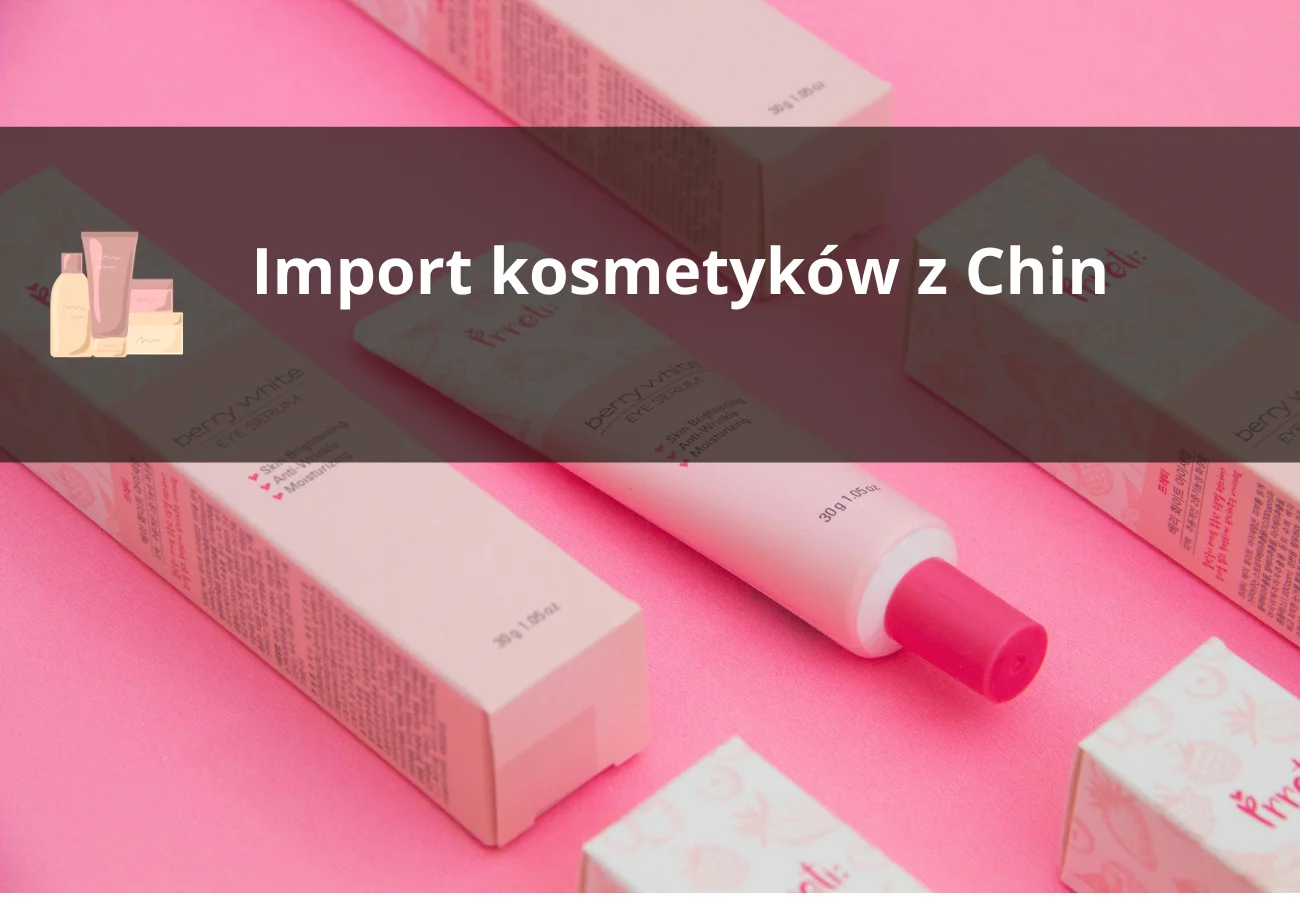This article discusses certification requirements, the registration process and other important information regarding the import of cosmetics from China to Poland. You will learn what certificates and markings Chinese cosmetics must have, how the registration process on the Polish market works, as well as the safety and quality standards used in the production of these products. In addition, the article touches on proper labelling on the packaging of Chinese cosmetics sold in Poland and the consequences of importing cosmetics from China, where animal testing is still common. Finally, the latest trends in the Chinese cosmetics industry and popular cosmetic brands from China and their unique features will be presented.
1. Certification requirements for cosmetics from China
Importing cosmetics from China to Poland involves meeting certain certification requirements. There are a number of specific certificates and markings that cosmetics imported from China must have in order to be legally sold on the Polish market.
One of the most important documents is the Cosmetic Product Safety Report. This report must contain detailed information on the composition of the cosmetic, its physical and chemical properties, microbiological quality and possible adverse reactions. Furthermore, the importer must register each imported cosmetic on the CPNP (Cosmetic Products Notification Portal), which is a database of all cosmetics placed on the market in the European Union.

10% discounts for the first transport
On offer: Rail, air and sea transport
3 Customs and excise duties on cosmetics imports from China
Below are sample duty rates for selected product categories:
- Shaving preparations, used before or after shaving - 6.5%
- Deodorants - 6.5%
- Perfumed bath salts and other bath preparations - 6.5%
- Perfume - 0%
- Cosmetic or beauty preparations and skin care preparations -0%
- Eau de Toilette - 0%
- Beauty preparations for the lips - 0%
- Beauty preparations for the eyes - 0%
- Manicure or pedicure preparations - 0%
- Powders, even pressed - 0%
- Shampoos - 0%
- Preparations for perming or straightening hair - 0%
- Hairspray - 0%
Although most cosmetics are subject to zero duty, be aware that in some cases excise duty must be paid. Where products have an ethanol content in excess of 1.2% by volume, an excise duty of £6275 per 100% by volume of that ethanol is added to the standard duty.
2. the registration process for cosmetics from China in Poland
The process of registering cosmetics imported from China on the Polish market is necessary to legally market these products. This registration aims to ensure safety and consumer protection and to meet the requirements of the cosmetic product regulations.
In order to proceed with the registration process, the importer must provide the relevant documentation, which includes, among others, a Cosmetic Product Safety Report. This report contains detailed information on the cosmetic's composition, physical and chemical properties, microbiological quality and possible adverse reactions. In addition, the importer must register each imported cosmetic on the CPNP (Cosmetic Products Notification Portal), which is a database of all cosmetics placed on the market in the European Union.
3. safety and quality of Chinese cosmetics
Chinese cosmetics are gaining popularity on the Polish market, but it is important that we pay attention to their safety and quality. In China, there are specific safety and quality standards used in the production of cosmetics, which are regulated by the relevant institutions and government agencies. Before cosmetics are placed on the market, quality checks and product testing are also carried out to ensure that the products meet certain requirements.
It is important that importers carefully check the suppliers and manufacturers of Chinese cosmetics and make sure that the products have undergone the appropriate testing and quality control. It is also important to have documentation proving that the cosmetics comply with the required safety and quality standards. In this way, we can be sure that imported cosmetics from China are safe for users and meet high quality standards.
4. Appropriate labelling on the packaging of Chinese cosmetics
In order to be able to legally sell Chinese cosmetics in Poland, it is necessary to display the relevant information on the product packaging. These indications are intended to ensure the safety and protection of consumers and to provide them with the necessary information regarding the cosmetic in question.
The following information should appear on the packaging of a Chinese cosmetic sold in Poland:
- Composition: All cosmetic ingredients should be listed accurately according to the International Nomenclature of Cosmetic Ingredients (INCI). Potentially allergenic substances found in the formulation should also be listed.
- Date of production: It is important to include the date of production on the packaging to allow the consumer to judge the freshness of the product.
- Expiry date: Every cosmetic should have an expiry date, which tells the consumer how long the product will continue to be safe and effective for use.
- Quantity of product: The quantity of cosmetic product contained in the packaging should be indicated on the packaging so that the consumer can assess how much product they are actually receiving.
All this information should be clearly and permanently displayed so that the consumer can easily find and understand it. Proper labelling on the packaging of Chinese cosmetics is crucial to ensure safety and consumer satisfaction.
5. ban on animal testing of cosmetics in the EU vs. imports from China
The ban on animal testing of cosmetics is one of the important regulations in force in the European Union. As part of the fight for animal welfare and environmental protection, the EU has introduced a total ban on animal testing for cosmetics. This is an important step towards a more ethical and responsible approach to the production of cosmetics.
Unfortunately, in China, animal testing of cosmetics is still common and often required by regulations. This means that many Chinese cosmetics are subjected to animal testing before being put on the market. The consequence of this is that when importing cosmetics from China, there is a risk that the products may have come from animal testing. China is slowly moving away from testing cosmetics on animals. This is an important provision to consider when importing cosmetics from China.
6. Trends and popular Chinese cosmetic brands
The Chinese cosmetics industry is growing rapidly and bringing many innovative products to the market. There are currently several major trends in Chinese cosmetics that are gaining popularity.
One of the most important trends is the growing interest in natural ingredients and organic products. Customers are increasingly looking for cosmetics that are safe for the skin and the environment. In response to this demand, many Chinese cosmetic brands are focusing on producing natural, organic or vegan products. They use traditional Chinese ingredients such as herbs, algae or pearls to create unique formulas with skincare and nourishing effects.
| Trends in China's cosmetics industry | Popular cosmetic brands from China |
| Natural ingredients and ecology | Chando, Herborist |
| Colour cosmetics | Perfect Diary, Marie Dalgar |
| Skin care cosmetics | Yunifang, Pechoin |
Also worth noting is the growing popularity of colour cosmetics. Chinese brands such as Perfect Diary and Marie Dalgar offer rich eyeshadow palettes, intensely coloured lipsticks and a variety of make-up products. These cosmetics are often inspired by the latest fashion trends and are an excellent choice for those who want to experiment with their look and create original make-up looks.
In addition to this, Chinese cosmetic brands are also known for their high-quality skincare products. Yunifang and Pechoin are examples of brands that offer a wide range of face and body care products. Their formulas are based on innovative ingredients and technologies that are designed to improve the condition of the skin and ensure a healthy appearance.







Interesting article, particularly as more and more companies are outsourcing cosmetics production to China.